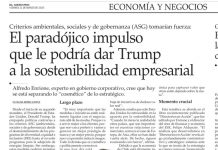Fuente: Directors & Boards
Autor: David A. Brown and Luke Trompeter
It took less than three months for the virus to spread to tens of thousands in China, make its way to Europe and then to the United States. Markets responded with the worst weekly decline since the 2008 financial crisis. The United States Securities and Exchange Commission (SEC) asked U.S. publicly traded companies with any China operations to disclose any coronavirus threats or risk in upcoming financial reports.
As the situation evolves, it is too early to measure the impact the coronavirus will have on companies. However, directors should stay up to date on the strategic risks that the virus poses to their companies and how management is responding to these risks.
Risk oversight is a primary function of the board of directors and in a case like that with the coronavirus, there are certain risk oversight areas the board should consider.
- Risk heat mapping: Boards (or a designated committee) often regularly engage in risk mapping and analysis exercises to ensure that management is both thinking about the risks the company is facing and taking appropriate and proportional measures to address such risks. While this is usually an annual exercise, the board (or its designated committee) may undertake an interim review of the company’s risks with a view toward potential impacts from the spread of the coronavirus and the reaction to it.
- Business interruption or contingency plans: In conjunction with the heat mapping exercise, many companies have in place business interruption or contingency plans for when production or other business operations are unexpectedly disrupted. Directors should review with management the viability of these plans and ensure that they are effective from short to long terms and everywhere in between for contingencies that may be caused by a health epidemic such as the coronavirus. If a company currently lacks an adequate plan, it is not too late to develop and implement a new one or make necessary adjustments to an existing plan. These plans will likely need to be regularly reviewed by the board and management and adjusted as the situation continues to evolve.
- Supply chain oversight: In the current environment, one important area for risk oversight is a company’s supply chain. The board should request updates from management on the impact the coronavirus is having (or may have) on the chain. Directors should be aware of the potential impacts a slowdown in production may have on customer and supplier relationships. If necessary, a company may need to financially support a key or sole supplier to maintain its own customer relationships and delivery obligations. Similarly, a decline in production revenue may also call for utilizing capital from other parts of the company to ensure a company’s supply chain remains operational. Directors should stay informed of management’s financial plans to lessen the stress on a company’s supply chain and minimize losses.
- Board meetings: Although the situation remains fluid and uncertain, boards may feel the need to call a special board meeting to address risks caused by the coronavirus threat. However, this will depend on the company’s industry and the nature of any continued economic disruption. Well-developed contingency plans that are modified as necessary to respond to the evolving situation can minimize the impact of such risks and put a company in a better position to recover. Additionally, boards should be aware of when public announcements may need to be made if members of senior management or directors become temporarily unable to serve in light of these events.
Furthermore, boards would benefit from having contingency plans in place for their own meetings and meeting schedules should their regular schedules be affected. Air travel, especially internationally, may be restricted for directors and management. Companies should be prepared for the possibility of holding telephonic (or video conference) board meetings should in-person meetings become infeasible.
The audit committee often is tasked to lead the board’s effort in risk oversight. The audit committee will also have additional responsibilities for oversight of the company’s audit and financial controls and procedures, liquidity position, and public reporting and disclosure obligations associated with financial reporting. However, all directors should request to be continually updated and review company plans to ensure they are implemented effectively.
Given the fluid nature of the situation, some companies are updating or confirming prior earnings guidance to give their investors and analysts a preliminary indication of how the coronavirus may impact their business. The audit committee should be aware of management’s assumptions and predictions for the financial impact of the coronavirus and ask appropriate questions if the company has decided to issue updated guidance or to confirm its existing guidance.
Additionally, the coronavirus may make financial audits more difficult to complete if offices, facilities or other locations are closed and personnel are not able to report to work or have to work remotely. Furthermore, travel restrictions may make it difficult for auditors to have access to the necessary systems and personnel to complete their audit. Audit committees should be in regular contact with management and their external auditors to ensure that an appropriately scoped audit or review of the company’s financial report is being completed.
To ease reporting concerns, the SEC has announced that it will provide companies guidance as the situation evolves and even offered relief to companies, on a case-by-case basis, that may be delayed in completing their audits. The SEC also announced that companies that have questions about completing audits or its financial reporting should reach out to the Public Company Accounting Oversight Board or the applicable SEC office. Keeping the SEC informed of a company’s situation may increase the possibility of a reporting extension or lessen the potential penalties.
The coronavirus outbreak may not impact a company’s balance sheet or cash flows for one or two more quarters. The audit committee should understand and stay abreast of the potential impact the coronavirus could have on the company’s liquidity and its capital resource needs. Additionally, depending on the size or extent of any potential disruption, the audit committee should discuss with management potential goodwill impairments.
In the face of a fast-moving situation like that of the coronavirus epidemic, companies and their boards need to be prepared without acting irrationally. Directors should stay informed of the latest updates, communicate regularly with senior management, and ensure their audit committee can complete its risk oversight function effectively as they position their companies to weather the uncertainty associated with the coronavirus.












